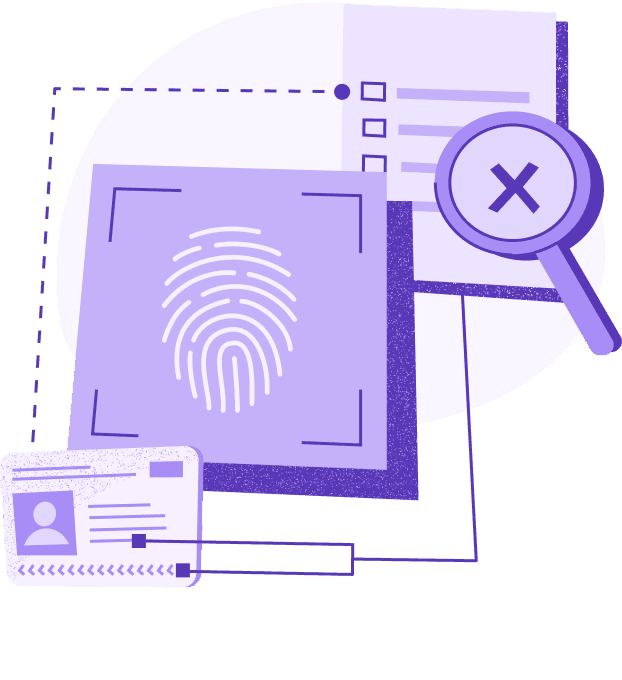Article
4 min read
A Guide to Employee Background Checks in the Philippines
Employee background checks
Legal & compliance

Author
Michał Kowalewski
Last Update
September 05, 2025

Table of Contents
Essential information for a background check in the Philippines
Are background checks legal in the Philippines?
What types of background checks are illegal in the Philippines?
Common background check industries in the Philippines
Types of employee background checks in the Philippines
Background check mistakes to avoid in the Philippines
Step-by-step guide to employee background checks in the Philippines
Key takeaways
- Background checks are legal in the Philippines, but require informed consent and data privacy compliance (DPA)
- Common checks include criminal records, employment history, and education verification. Avoid discriminatory practices and gathering irrelevant information
- Respect cultural emphasis on trust by considering character references and prioritize data security throughout the process
Employee background checks should be an integral part of your hiring process in the Philippines. Although not mandatory, they are a common practice, especially in banking, finance, business process outsourcing (BPO), healthcare, education, retail and hospitality.
The Philippines are a popular destination not only for travel, but also for global hiring. This country offers a large and growing talent pool with strong English communication skills, especially in IT and remote assistance roles. Combined with competitive labor costs, it makes the Philippines an attractive option for global companies seeking skilled talent.
In this competitive environment, conducting background checks becomes important for companies to mitigate risks and make informed hiring decisions. These checks help verify information provided by candidates, ensuring they possess the qualifications and meet the necessary criteria for the role.
In this article you’ll learn:
- How to run an effective and legal employment screening in the Philippines
- What are the common types of employee checks in the Philippines
- Step-by-step process of a thorough employee screening
- What mistakes to avoid when performing a background check in Philippines
Essential information for a background check in the Philippines
An employee background check is the process of verifying a potential hire’s work history, education, professional qualifications, and any criminal records they might have. It’s particularly beneficial to run before finalizing an employment offer or signing a contract, ensuring the candidate meets the company's standards and requirements.
When conducting employee background checks in the Philippines, it's vital to adhere to the Data Privacy Act of 2012 (DPA) and The National Privacy Commission (NPC).
- Data Privacy Act of 2012 (Republic Act No. 10173): This is the primary legislation governing data protection in the Philippines. It outlines the rights of individuals over their personal data and the responsibilities of organizations that collect and process these data.
- National Privacy Commission (NPC): Acts as the guiding force for data privacy in the Philippines. They provide resources, guidance, and training to ensure organizations, like employers conducting background checks, comply with the Data Privacy Act (DPA) and protect individual data rights.
- Implementing Rules and Regulations (IRR): These provide more specific guidelines on how to comply with the DPA, including provisions relevant to background checks.
Furthermore, the Philippines has a unique cultural emphasis on trust and integrity in the workplace. Employers often prioritize character references and testimonials from previous employers as part of the background check process to assess an individual's trustworthiness and work ethic.
Are background checks legal in the Philippines?
Background checks are legal in the Philippines, provided they comply with the provisions of the Data Privacy Act.
Recruiters must ensure that the candidate provides explicit consent before initiating any background checks. Although it’s not specified in the law, written consent is recommended for documentation and compliance purposes. The DPA emphasizes the protection of an individual's right to privacy, ensuring that personal information is processed in a manner that upholds the individual's rights.
Compliance
What types of background checks are illegal in the Philippines?
In the Philippines, background checks certain types of pre-employment background checks require caution. While verifying qualifications and experience is encouraged, some practices cross legal and ethical boundaries.
Global employers should stay clear of the following prohibited practices:
- Unrestricted data collection: Avoid gathering unnecessary information beyond what's relevant to the job requirements and responsibilities
- Gathering sensitive information: Background checks involving sensitive personal information like health records, religious beliefs, and political affiliations are strictly prohibited without the candidate's explicit consent
- Non-consensual financial checks: Accessing a candidate's financial records without proper authorization, such as conducting credit checks, is illegal. Always obtain the candidate's informed consent and comply with the DPA for such checks.
- Discriminatory practices: Engaging in practices that discriminate based on a candidate's protected characteristics, like their religion, ethnicity, or sexual orientation, is illegal and unethical
- Data security breaches: Implement robust security measures to protect the collected personal data from unauthorized access, loss, or misuse
Common background check industries in the Philippines
In the Philippines, various industries rely on employee background checks to ensure the integrity and reliability of their workforce. Some of the common industries where background checks are prevalent include:
- Banking and finance: Due to the sensitive nature of financial transactions, background checks are commonly conducted to ensure the integrity and trustworthiness of employees handling financial matters
- BPO (Business Process Outsourcing): BPO companies often conduct extensive background checks to uphold client confidentiality and data security standards
- Healthcare: Background checks are crucial in the healthcare industry to ensure the safety of patients and to comply with regulatory requirements
- Education: Educational institutions conduct background checks to verify the qualifications and suitability of teaching and administrative staff
- Retail and hospitality: Background checks are conducted to ensure the safety of customers and to maintain a trustworthy workforce in customer-facing roles
Types of employee background checks in the Philippines
Effective employment screening in the Philippines covers essential aspects to evaluate a candidate's abilities. Knowing these areas helps employers tailor screening processes to meet job requirements and legal standards.
| Type of Check | Common in the Philippines? | Reason |
|---|---|---|
| Criminal Record Check | Common | A standard check to assess the candidate's criminal history and ensure a safe working environment |
| Employment History Verification | Common | This check is common across all industries to ensure the accuracy of the candidate's work experience |
| Educational Background Verification | Common | Employers commonly verify the educational qualifications of candidates to ensure they meet the required academic credentials for the position |
| Credit History Check | Less Common | While common in financial institutions, this check is less common in other industries due to the sensitive nature of financial information |
| Social Media Screening | Less Common | Increasingly common, this involves reviewing a candidate's public online presence to gather insights into their behavior, character, and professionalism |
Background check mistakes to avoid in the Philippines
Whether you’re hiring employees or contractors in the Philippines, there are a few things you shouldn’t do as an employer when it comes to background checks:
- Failing to obtain candidate consent: Conducting background checks without obtaining the candidate's explicit consent violates the Data Privacy Act and can result in legal repercussions
- Neglecting data privacy: Mishandling personal information obtained during background checks can lead to privacy breaches and legal penalties. Recruiters must ensure strict compliance with the Data Privacy Act
- Relying solely on online information: Depending solely on online information, such as social media profiles, may lead to biased hiring decisions and overlook crucial aspects of a candidate's qualifications and character
- Disregarding cultural considerations: Neglecting the importance of character references and testimonials from previous employers may overlook crucial insights into a candidate's trustworthiness and work ethic, which are highly valued in the Philippines
- Skipping criminal record checks: Failing to conduct thorough criminal record checks can pose risks to the safety and integrity of the workplace, especially in roles that involve interactions with vulnerable populations
Step-by-step guide to employee background checks in the Philippines
Employers looking to hire in the Philippines should follow the list of steps below to ensure legal and effective and thorough employee background checks.
- Obtain candidate consent: Before initiating any background checks, recruiters must obtain the candidate's explicit consent in writing, acknowledging the specific types of checks to be conducted and the purpose of the checks
- Verify identity: Validate the candidate's identity through official documents, such as government-issued IDs or passports, to ensure the accuracy of the information provided
- Verify employment history: Contact previous employers to verify the candidate's employment history, job responsibilities, and work performance
- Verify educational background: Verify the authenticity of the candidate's educational qualifications by contacting educational institutions and confirming the degrees or certifications obtained
- Check references: Request character references from the candidate to gain insights into their personal attributes, work ethic, and interpersonal skills
- Check criminal record: Conduct a criminal record check through the Philippine National Police to ensure the candidate does not have any prior criminal convictions
- Check credit history: If the position entails financial responsibilities, recruiters may conduct a credit history check with the candidate's consent
- Screen social media: Review the candidate's public social media profiles to assess their online behavior and ensure alignment with the company's values and culture
- Document the process: Once the background checks are completed, ensure that all personal information obtained is securely stored and handled in compliance with the Data Privacy Act
- Inform the candidate: Once the background check is complete, communicate the findings to the candidate and allow them to address any discrepancies or provide context for the information obtained
You can also automate this process using Deel, and get a fast employee background check, with results coming in a matter of minutes.
After exploring various providers, it's clear that Deel is the best on the market. We were able to hire approximately 40 employees in the Philippines within a matter of months. Their background check process was easy and effective and made us feel safe about hiring in new markets. We're truly grateful for the opportunity to work with this team!
—Bree Cohen,
VP of Talent
Background checks

Michał Kowalewski a writer and content manager with 7+ years of experience in digital marketing. He spent most of his professional career working in startups and tech industry. He's a big proponent of remote work considering it not just a professional preference but a lifestyle that enhances productivity and fosters a flexible work environment. He enjoys tackling topics of venture capital, equity, and startup finance.
















